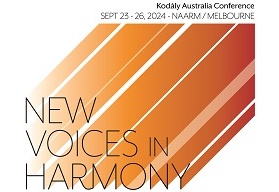Kodály Australia is proud to congratulate our President Dr Jason Goopy who recently completed Doctor of Philosophy studies at the School of Music, University of Queensland.
Dr Goopy’s research investigated adolescent boys’ music beliefs, values and identity work in a single-sex independent school. His thesis features six narratives of students at the end of their secondary schooling providing rich insight into the role of music and school classroom music in adolescent identity formation. Dr Goopy’s findings demonstrate the ways school music education can and should seek to positively shape and support young peoples’ musical identities.
Please find below a short biography of Dr Goopy, his thesis abstract and a link to access the full dissertation.
I encourage you to engage with this significant work in your professional reading and research.
Best wishes
Jason Boron
Vice President
Kodály Australia
(Also known as the Kodály Music Education Institute of Australia)
www.kodaly.org.au
Biography:
Jason Goopy is a recognised leader in music education and experienced choral conductor. He is currently Head of The Arts & Choral Coordinator at Ambrose Treacy College and Sessional Academic at the University of Queensland (UQ) and Griffith University. His doctoral research investigated adolescent boys’ music beliefs, values and identity work in a single-sex independent school. Jason is the current President of Kodály Australia, a Council member of the Australian Society for Music Education Queensland Chapter and the Representative of the Queensland Catholic Education Commission for the Queensland Advisory Committee for the Australian Music Examinations Board. He is in regular demand as a consultant and presenter for music education workshops and programs throughout Australia, and has presented workshops and academic papers at national and international conferences.
Thesis Abstract:
Adolescent boys’ music beliefs, values, and identity work in a single-sex independent school
https://doi.org/10.14264/uql.2020.193
Music has the potential to shape and support who we are and who we will become. Recent research has highlighted the significance of musical identities in adolescent identity work. The term “identity work” acknowledges that the construction of identities is continuously ongoing and evolving. Adolescents’ musical identities can be examined by their uses of music (music in identities) and the musical roles they adopt (identities in music). Psychological perspectives also seek to explain musical behaviours by investigating inner states such as music beliefs and values. Musical identities can be shaped and supported by music learning and development, highlighting the potential contributions and responsibilities of school music education. Little research has specifically examined the role of secondary school class music (also known as classroom music or general music) education in boys’ identity work.
This study investigated adolescent boys’ music beliefs, values, and identity work in a single-sex independent school, interrogating the following questions: 1. What are the music beliefs, values, and uses of adolescent boys in a single-sex independent school? 2. How do these adolescent boys use music to shape and support their identity work? 3. What aspects of class music in this context shape and support adolescent boys’ identity work in and through music? Qualitative research was conducted within a constructivist paradigm, adopting a relativist ontology and subjectivist epistemology. Narrative inquiry and naturalistic case study methodology were used. The research setting was my place of employment at the time; an Australian independent P–12 boys’ school. Consequently, the study methodology was underpinned by continuous teacher–researcher reflexivity. Data were generated and triangulated using one-on-one semi-structured interviews incorporating a “draw and tell” artefact elicitation technique with ten Year 12 students and their parents. Students had continuously studied class music with me over a period of 2.5 to 5 years. Narrative analysis and analysis of narratives approaches were employed in the interpretation of data. This resulted in the co-construction of six unique student stories. The collective analysis of narratives informed the discussion and included the remaining four student interview transcripts, providing a means to corroborate and/or challenge the findings presented in the six student stories.
Findings indicate that the music beliefs and values of adolescent boys in this study are mental states which are inseparable from their behaviours and actions, overlapping and fusing together. Their beliefs, values, and uses of music are interconnected, individualised, diverse, and evolving. They use music as a means of making and managing the self; establishing, developing, and maintaining relationships with others; and, developing proficiency in the discipline of music. Adolescent boys in this study use music in personalised and evolving ways as an ongoing resource to shape and support their musical identities and possible selves. They have multiple and circumstantial musical identities and the extent of their engagement with music, and music’s influence, varies between individuals. Participants are self-aware and able to identify these differences. They use music as a resource for self-to-self and self-to-others in the construction of their musical identities. Adolescent boys use prior musical experiences in music learning and development in order to inform their present and projected future use of music. The music family script and the conflict between boys’ passion for music and their perceived future financial security are also found to influence their identity work.
Despite mixed perspectives in the literature, students in this study articulate the view that school class music has a significant and positive role in shaping and supporting their identity work. My professional relationship with the students was a significant factor in their identity development, with students describing me as a credible model and expert; able to ignite and share passion; and, express genuine care towards their learning and well-being. Student flourishing is at the core of my philosophy and pedagogy, occurring through the explicit development of musical understanding; nurturing learner agency; creating a community of ethical music learners; and, entangling students’ musical worlds. My curriculum values diverse music literature; sequentially layers music domains; and, provides a range of authentic music learning experiences. This research study contributes new knowledge to the fields of music, music psychology, and music education.
Further research is justified to examine the interplay between past, present, and projected uses of music and its role in identity work. This study demonstrates school music education can and should seek to positively shape and support student musical identities, and future investigations of participants’ perspectives from diverse settings are warranted. It is recommended that government policy and practices are established in order to ensure that all Australian children in early childhood, primary, and lower secondary school have access to class music education, with consideration given to initial specialist music teacher education. The entanglement of school music teachers and learning experiences and their combined role in student identity work warrants further investigation. Continued research concerning the influence of the family script is needed, and students and families would benefit from specialised music pathway and career education programs in order to assist in the construction of possible selves. Future research investigating the contribution of music identity work to broader identity theory is justified. The use of “draw and tell” artefact elicitation techniques produced rich participant responses and its use in future research with adolescents and adults is worthy of further consideration.



